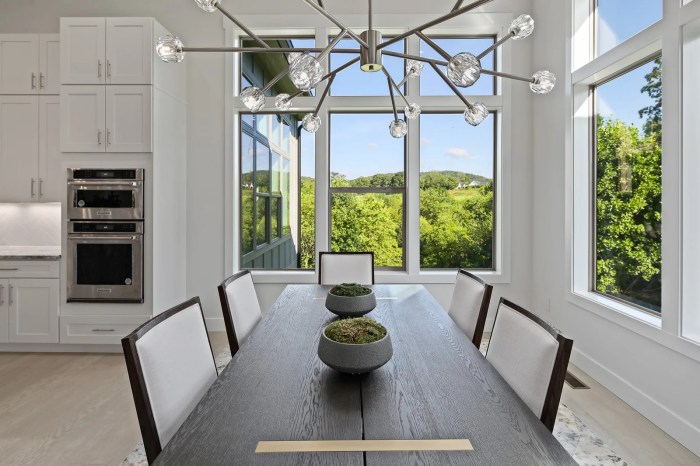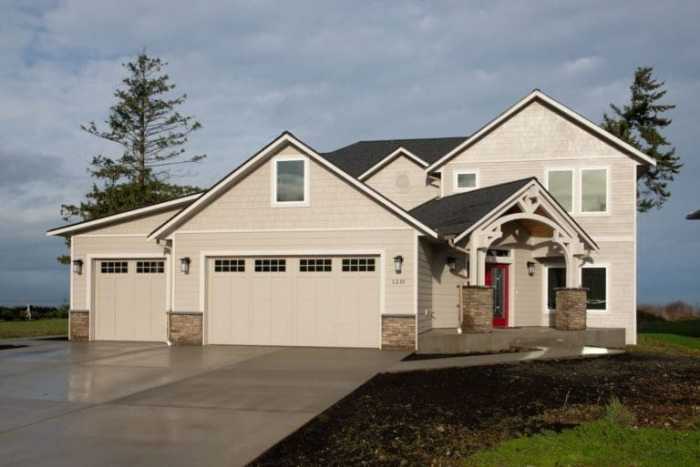
Custom home vs pre-built home sets the stage for a captivating exploration of the choices that aspiring homeowners face. With the growing interest in personalized living spaces, understanding the distinctions between these two options is crucial. While custom homes offer tailored designs to fit individual tastes, pre-built homes provide convenience and speed. This discussion delves into their defining characteristics, financial implications, and factors to consider in making an informed decision.
In this article, we will break down the unique attributes of custom and pre-built homes, providing examples of features, costs, and the overall impact on your lifestyle. By weighing the pros and cons of each, potential buyers can gain insight into what aligns best with their needs and aspirations.
Custom Home Definition vs Pre-Built Home Definition
When choosing a new home, potential buyers often face a choice between custom homes and pre-built homes. Understanding the fundamental differences between these two options is crucial in making a decision that aligns with your lifestyle and budget. Custom homes are tailored to individual specifications, while pre-built homes are designed and constructed based on standard plans. Custom homes, as the name suggests, are unique residences built according to the specific desires and requirements of the homeowner.
These homes often involve a collaborative process with architects, designers, and builders, allowing for personalized features that reflect the homeowner’s style and functional needs. Common characteristics include unique floor plans, high-end materials, and energy-efficient technologies, such as solar panels or smart home systems. On the other hand, pre-built homes, also known as spec homes or production homes, are built according to predetermined designs and specifications set by the builder.
These homes are typically constructed in bulk, allowing for quicker completion and lower costs. Features often found in pre-built homes include standard layouts, traditional materials, and common finishes, which may limit customization. While these homes may still offer some choices in terms of fixtures or colors, the overall design remains consistent across multiple units.
Characteristics and Examples
The distinctions between custom and pre-built homes go beyond mere aesthetics and encompass several critical factors. Understanding these characteristics can help buyers evaluate their options effectively.Custom homes typically feature:
- Tailored designs that cater to the homeowner’s preferences and needs.
- High-quality materials selected for durability and aesthetics.
- Innovative technologies integrated for functionality and energy efficiency.
- Unique layouts that maximize space according to personal living styles.
- Landscaping and outdoor features designed specifically for the property.
In contrast, pre-built homes often include:
- Standard layouts that cater to a broad market rather than individual preferences.
- Cost-effective materials that may prioritize affordability over luxury.
- One-size-fits-all features, limiting customization options.
- Faster construction timelines due to the assembly line approach.
- Common landscaping that fits within a community aesthetic.
Advantages and Disadvantages
Choosing between a custom home and a pre-built home involves weighing various advantages and disadvantages. Buyers should consider both their needs and their budget when making this decision.The advantages of custom homes include:
- Complete control over design and features, ensuring the home reflects personal tastes.
- Increased potential for innovative, eco-friendly building practices.
- Higher resale value due to unique characteristics and quality craftsmanship.
However, there are some disadvantages:
- Higher costs associated with custom designs and high-end materials.
- Longer construction times leading to delayed move-in dates.
- The complexity of managing multiple contractors and suppliers.
On the other hand, pre-built homes provide notable benefits:
- Lower initial costs, often making them more accessible for first-time buyers.
- Quicker move-in times, allowing buyers to settle in sooner.
Yet, they come with drawbacks:
- Limited customization options may not meet everyone’s needs.
- Potentially lower resale value due to standardization.
- Less opportunity for personalization in construction and design choices.
Cost Comparison and Financial Considerations
Investing in a home is a significant financial decision, whether you’re leaning towards a custom-built house or a pre-built option. Understanding the cost comparison and financial implications of each choice is essential for making an informed decision. This section will delve into the various costs associated with both types of homes, helping you navigate the financial landscape involved in this important investment.
Financial Aspects of Custom Homes
Custom homes typically come with a higher upfront cost compared to pre-built homes. This is largely due to the personalized nature of custom builds, which often includes unique architectural designs, high-quality materials, and advanced technology. The financial planning for a custom home involves several key components:
1. Land Acquisition
Costs will vary depending on the location, size, and zoning of the land. Urban areas may command higher prices compared to rural ones.
2. Design and Architectural Fees
Hiring an architect or designer to create your dream home can add significant costs. These fees often range from 5% to 15% of the total construction cost.
3. Construction Costs
The cost to build a custom home can significantly vary, typically ranging from $150 to $500 per square foot, heavily influenced by materials and labor.
4. Permitting and Inspection Fees
Obtaining the necessary permits and passing inspections can also incur additional costs, which vary by location.
“The total cost of a custom home can often exceed initial estimates due to unexpected expenses during construction.”
Cost Factors for Pre-Built Homes
Pre-built homes can often be more financially accessible than custom homes. The costs are generally more predictable, as they are based on existing designs and established construction methods. Here are some cost factors to consider:
Purchase Price
A pre-built home often has a set price based on its location, square footage, and features. This price is typically influenced by the housing market and can vary significantly from one neighborhood to another.
Closing Costs
Buyers often face closing costs which may include mortgage fees, title insurance, and attorney fees, typically around 2% to 5% of the purchase price.
Homeowners Association Fees
In some communities, there may be additional monthly or annual fees associated with maintaining common areas and amenities.
“Pre-built homes can provide a more straightforward financial commitment due to their fixed pricing and established costs.”
Estimating Costs for Both Options
Estimating costs accurately is crucial for both custom and pre-built homes. Here are some methods to help with these estimations:
Custom Home Estimation
Utilize tools like construction cost calculators available online, or consult with builders to develop a comprehensive budget that includes land, construction, and additional fees.
Pre-Built Home Estimation
Analyze recent sales data in the area for similar properties to gauge fair market value, and consult with a real estate agent for insights into closing costs and ongoing expenses.
Financing Options and Mortgage Considerations
Financing a home purchase is a critical aspect regardless of whether it’s a custom or pre-built home. Here are some financing considerations for both:
Custom Home Financing
Construction loans are typically used to finance custom builds, allowing you to borrow money as construction progresses. After completion, this loan is often converted into a standard mortgage. Expect higher interest rates and a more complex application process.
Pre-Built Home Financing
Traditional mortgages are often available for pre-built homes, typically offering lower interest rates and more straightforward terms. Buyers can also explore FHA loans or VA loans if they qualify, which can reduce down payment requirements.
“Understanding your financing options can significantly impact the overall cost and affordability of your new home.”
Choosing the Right Option

When deciding between a custom home and a pre-built home, several factors come into play that can significantly influence the final choice. Understanding these factors can help potential homeowners align their decisions with their lifestyle, family needs, and personal preferences. Each option has its advantages and considerations that cater to different types of buyers.Key factors influencing the decision include location, family needs, and lifestyle.
Choosing the right location is paramount; it not only affects daily commutes but also the overall quality of life. Families with children might prioritize proximity to schools and parks, while professionals may seek urban settings with easy access to work. Additionally, individual lifestyle choices can dictate the size and layout of the home. For instance, a growing family may need more bedrooms and living space, while empty nesters might prefer a low-maintenance property.
Flexibility and Personalization
The flexibility and personalization options available with custom homes can greatly enhance the living experience, providing a space that reflects individual tastes and needs. Custom homes allow buyers to choose everything from the architectural style to the floor plan, materials, and finishes, making it a unique and tailored experience. This degree of personalization can be particularly appealing for those with specific preferences or distinctive requirements, such as eco-friendly building practices or smart home technology integration.In contrast, pre-built homes offer convenience and quicker occupancy.
Typically, these homes are ready for immediate move-in, which appeals to buyers looking for a less stressful transition. However, the downside is the limited scope for customization; buyers may have to compromise on certain features or layouts that do not align with their vision. The choice between these options can also depend on budget considerations. Custom homes often come with a higher initial cost due to the design and construction process, whereas pre-built homes can offer more predictable pricing.
It’s essential for buyers to weigh their desire for personalization against their budget constraints.
Role of Real Estate Agents
Real estate agents play a crucial role in guiding buyers through the selection process for both custom and pre-built homes. Their expertise helps potential homeowners navigate the complexities of the housing market, ensuring that they make informed decisions that align with their needs and financial capabilities. For those considering custom homes, agents can connect buyers with reputable builders and architects who can bring their vision to life.
They assist in evaluating design options and understanding the implications of various choices, thereby facilitating a smoother building process. On the other hand, when it comes to pre-built homes, agents provide insights into the best neighborhoods, recent market trends, and available properties. A skilled real estate agent can also negotiate on behalf of the buyer, whether it’s for a custom build or a pre-existing home, ensuring that they receive the best possible deal.
Their knowledge of local zoning laws and regulations can also aid buyers in understanding what is possible in terms of construction and modifications, further influencing the decision-making process.
Epilogue

In conclusion, weighing the benefits of custom homes against the practicality of pre-built options allows prospective homeowners to make educated choices. Whether you lean towards the flexibility of a personalized build or the efficiency of an already established property, understanding both paths is vital. With the right knowledge, you can embark on a journey that truly reflects your dream home, tailored to your lifestyle and preferences.
User Queries
What are the main differences between custom and pre-built homes?
Custom homes are designed according to the owner’s specifications, while pre-built homes are constructed based on standard designs and layouts.
Are custom homes more expensive than pre-built homes?
Generally, custom homes tend to have higher costs due to personalized features and construction requirements, although the price varies based on location and design.
How long does it take to build a custom home compared to buying a pre-built home?
Building a custom home typically takes several months to a year, depending on complexity, whereas purchasing a pre-built home can often be completed in weeks.
Can I finance a custom home differently than a pre-built home?
Financing options may differ; custom homes often require specialized loans, while pre-built homes usually qualify for standard mortgage programs.
What should I consider when choosing between the two?
Consider your budget, timeline, location, and personal preferences, including how much customization you desire versus the convenience of a ready-made home.





